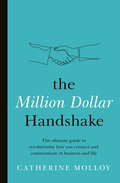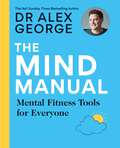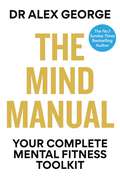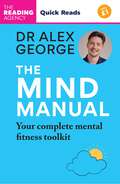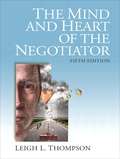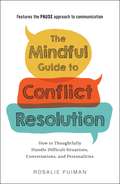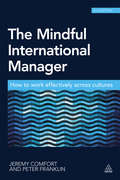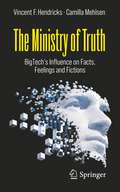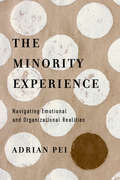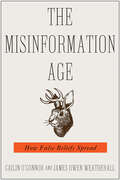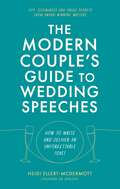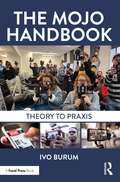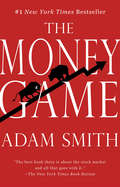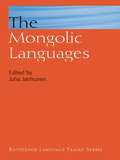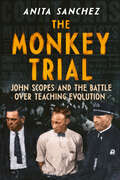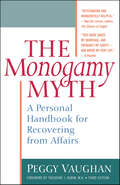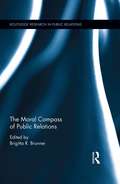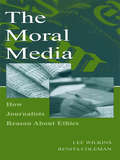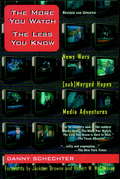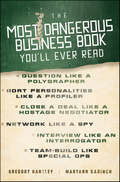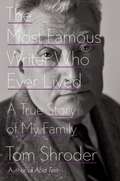- Table View
- List View
The Million Dollar Handshake: The ultimate guide to revolutionise how you connect in business and life
by Catherine MolloyThe Million Dollar Handshake is about more than making money - it is also about helping you feel a million dollars.First impressions do count - and few have as much impact as your handshake. A handshake can let the other person know if we are nervous, over-excited, confident or interested in them, and it can tell us so much about that person too, once we learn the signs.A great handshake can lead to a positive outcome, help secure a deal and result in an ongoing relationship. We can make a good or bad impression within just seven seconds of meeting someone.This book shows you how to create a great first impression; offers advice on how to let the other person see that you are interested in them, that they can trust and depend on you; and delves into what you do and don't want your handshake to convey.The Million Dollar Handshake will teach you how to communicate better in all parts of yourlife, starting with those crucial first seven seconds. But the skills you'll learn won't stopthere, because as you realise how your handshake reveals who you are, you'll be inspiredto make the positive changes that will result in better first-time and ongoing
The Mind Manual: Mental Fitness Tools for Everyone (Dr Alex George)
by Dr Alex GeorgeMental health matters! Learn how to assess your mental health today - and understand what's normal for you. Discover the seven universal truths that everyone should remember, and the mental fitness foundations that will boost you. And exercise your mind with the mental health toolkit that will help you thrive. Contents include -Part One: Your Mental Health Today-You are not alone-Know what feels normal for youPart Two: The Seven Universal Truths-Boundaries are beautiful-Mistakes are a must-havePart Three: Mental Fitness Foundations-It's good to talk-Why medical help mattersPart Four: Mental Health ToolkitResources
The Mind Manual: Mental Fitness Tools for Everyone (Dr Alex George)
by Dr Alex GeorgeMental health matters! Learn how to assess your mental health today - and understand what's normal for you. Discover the seven universal truths that everyone should remember, and the mental fitness foundations that will boost you. And exercise your mind with the mental health toolkit that will help you thrive. Contents include -Part One: Your Mental Health Today-You are not alone-Know what feels normal for youPart Two: The Seven Universal Truths-Boundaries are beautiful-Mistakes are a must-havePart Three: Mental Fitness Foundations-It's good to talk-Why medical help mattersPart Four: Mental Health ToolkitResources
The Mind Manual: Mental Fitness Tools for Everyone (Dr Alex George)
by Dr Alex GeorgeYour complete mental fitness toolkit by Dr Alex George'How are you? No really, how are you?'Learn how to assess your mental health today and understand what's normal for you.This is the mental health toolkit that will help you thrive.The Mind Manual is broken down into four parts with each one building on the last. Thegoal is to help you to establish your baseline, to know what peace feels like to you. Andthen to offer advice and tools to help you maintain that as much as possible.Part 1 looks at how to figure out where your baseline is and what normal feels like foryou. It's all about recognising your own needs so that you can best support yourselfwhen issues arise.Part 2 explores the seven universal truths and how they can support you when youmind is telling you lies. These seven truths are: Connection is your superpower; Sleepwill save you; Boundaries are beautiful; Mistakes are a must-have; Stress is the enemy;You are enough; Happiness is an inside job.Part 3 focuses on the foundations of mental fitness and explores the five different areasof life. These include what you eat and drink, how you release stress from your body,how much you move, how to talk out your thoughts and how to approach the medicalside of things.Part 4 is your mental health toolkit, where you'll find a wide range of worksheets andactivity tools to use. These can help while reading the book, but can also be usedregularly in your day-to-day life to check in on how you're coping.
The Mind Manual: Mental Fitness Tools for Everyone (Dr Alex George)
by Dr Alex GeorgeYour complete mental fitness toolkit by Dr Alex George'How are you? No really, how are you?'Learn how to assess your mental health today and understand what's normal for you.This is the mental health toolkit that will help you thrive.The Mind Manual is broken down into four parts with each one building on the last. Thegoal is to help you to establish your baseline, to know what peace feels like to you. Andthen to offer advice and tools to help you maintain that as much as possible.Part 1 looks at how to figure out where your baseline is and what normal feels like foryou. It's all about recognising your own needs so that you can best support yourselfwhen issues arise.Part 2 explores the seven universal truths and how they can support you when youmind is telling you lies. These seven truths are: Connection is your superpower; Sleepwill save you; Boundaries are beautiful; Mistakes are a must-have; Stress is the enemy;You are enough; Happiness is an inside job.Part 3 focuses on the foundations of mental fitness and explores the five different areasof life. These include what you eat and drink, how you release stress from your body,how much you move, how to talk out your thoughts and how to approach the medicalside of things.Part 4 is your mental health toolkit, where you'll find a wide range of worksheets andactivity tools to use. These can help while reading the book, but can also be usedregularly in your day-to-day life to check in on how you're coping.
The Mind Manual: Mental Fitness Tools for Everyone (Dr Alex George)
by Dr Alex GeorgeTHE SUNDAY TIMES BESTSELLER (December 2023)Mental health matters! Learn how to assess your mental health today - and understand what's normal for you. Discover the seven universal truths that everyone should remember, and the mental fitness foundations that will boost you. And exercise your mind with the mental health toolkit that will help you thrive.
The Mind Manual: Mental Fitness Tools for Everyone (Dr Alex George)
by Dr Alex GeorgeTHE SUNDAY TIMES BESTSELLER (December 2023)Mental health matters! Learn how to assess your mental health today - and understand what's normal for you. Discover the seven universal truths that everyone should remember, and the mental fitness foundations that will boost you. And exercise your mind with the mental health toolkit that will help you thrive.
The Mind and Heart of the Negotiator (5th Edition)
by Leigh ThompsonDelve into the mind and heart of the negotiator in order to enhance negotiation skills. The Mind and Heart of the Negotiator is dedicated to negotiators who want to improve their ability to negotiate--whether in multimillion-dollar business deals or personal interactions. This text provides an integrated view of what to do and what to avoid at the bargaining table, facilitated by an integration of theory, scientific research, and practical examples. This edition contains new examples and chapter-opening sections, as well as more than a hundred new scientific articles on negotiations.
The Mindful Guide to Conflict Resolution: How to Thoughtfully Handle Difficult Situations, Conversations, and Personalities
by Rosalie PuimanSuccessfully handle difficult conversations, remain civil, and end an argument peacefully with this straightforward and mindful guide to conflict resolution. It&’s important to share your thoughts and opinions with others—and even more important to be able to do so without starting an argument or offending someone. Now you can prevent and resolve conflicts with help from this guide covering everything from understanding your own emotions better and learning how to address people in different situations, to getting through a difficult conversation, coming to a positive conclusion, and disengaging yourself when necessary. The Mindful Guide to Conflict Resolution provides the essential tools to mindfully communicate during any challenging situation. With this practical and informative guide in hand, you have the power to transform any difficult exchange or disagreement into a positive, constructive conversation.
The Mindful International Manager
by Peter Franklin Jeremy ComfortThe Mindful International Manager tackles the management situations that international managers have to handle every day. Accessible and jargon-free it explains how to clarify local vs. international roles, support and develop a team, organize and coordinate boundaries of time and distance, and win commitment toward common goals. The authors, both interculturalists, include exercises and best practice advice and the experiences and insights of practising international managers. They combine their practical approach with great depth of insight into the challenges of working and managing internationally and include the results of new research findings and cutting-edge case studies on topics such as leadership, global nomads, cultural hybridity, virtual teams, coaching and mentoring across cultures and decision-making.
The Ministry of Truth: BigTech's Influence on Facts, Feelings and Fictions
by Vincent F. Hendricks Camilla MehlsenThe Ministry of Truth scrutinizes the information market in the era of the attention economy calling on citizens, public educators and politicians to action in averting the role of BigTech in critical infrastructure. Through phenomena such as influencers, ‘fake news’, and covid conspiracies, the authors reveal how social platforms control facts, feelings and narratives in our time to such a degree that they are the de facto arbiters of truth. BigTech seemingly controls the information infrastructure and also decides what we pay attention to. The authors suggest hope for a more democratic internet through their systematic analysis of the largest players of the information age. The aim is to amplify human agency for a robust deliberative democracy — not version 2.0 — but a lasting version with staying power. This book appeals to the general interest reader and professional invested in the mobilization of responsible technological development.Vincent F. Hendricks is Professor of Formal Philosophy at The University of Copenhagen. He is Director of the Center for Information and Bubble Studies (CIBS) funded by the Carlsberg Foundation.Camilla Mehlsen is Digital Media Expert and Spokesperson for the Danish child organization Children’s Welfare. She is author of several books on digital literacy and her work on digital media has been published in various newspapers and magazines.
The Minority Experience: Navigating Emotional and Organizational Realities
by Adrian PeiIt's hard to be in the minority. If you're the only person from your ethnic or cultural background in your organization or team, you probably know the challenges of being misunderstood or marginalized. You might find yourself inadvertently overlooked or actively silenced. Even when a work environment is not blatantly racist or hostile, people of color often struggle to thrive—and may end up leaving the organization. Being a minority is not just about numbers. It's about understanding pain, power, and the impact of the past. Organizational consultant Adrian Pei describes key challenges ethnic minorities face in majority-culture organizations. He unpacks how historical forces shape contemporary realities, and what both minority and majority cultures need to know in order to work together fruitfully. If you're a cultural minority working in a majority culture organization, or if you're a majority culture supervisor of people from other backgrounds, learn the dynamics at work. And be encouraged that you can help make things better so that all can flourish.
The Misinformation Age: How False Beliefs Spread
by James Owen Weatherall Cailin O'Connor“Empowering and thoroughly researched, this book offers useful contemporary analysis and possible solutions to one of the greatest threats to democracy.” —Kirkus ReviewsEditors’ choice, The New York Times Book ReviewRecommended reading, Scientific AmericanWhy should we care about having true beliefs? And why do demonstrably false beliefs persist and spread despite bad, even fatal, consequences for the people who hold them?Philosophers of science Cailin O’Connor and James Weatherall argue that social factors, rather than individual psychology, are what’s essential to understanding the spread and persistence of false beliefs. It might seem that there’s an obvious reason that true beliefs matter: false beliefs will hurt you. But if that’s right, then why is it (apparently) irrelevant to many people whether they believe true things or not?The Misinformation Age, written for a political era riven by “fake news,” “alternative facts,” and disputes over the validity of everything from climate change to the size of inauguration crowds, shows convincingly that what you believe depends on who you know. If social forces explain the persistence of false belief, we must understand how those forces work in order to fight misinformation effectively.“[The authors] deftly apply sociological models to examine how misinformation spreads among people and how scientific results get misrepresented in the public sphere.” —Andrea Gawrylewski, Scientific American“A notable new volume . . . The Misinformation Age explains systematically how facts are determined and changed—whether it is concerning the effects of vaccination on children or the Russian attack on the integrity of the electoral process.” —Roger I. Abrams, New York Journal of Books
The Modern Couple's Guide to Wedding Speeches: How to Write and Deliver an Unforgettable Speech or Toast
by Heidi Ellert-McDermottGroom or bride, straight or gay. Nail the perfect words to say.There's no longer an excuse for wedding speeches to be a tedious succession of predictable platitudes, outdated etiquette and cheesy wedding gags. This book is for nearlyweds who want to make their wedding speeches one of the day's highlights.Written by Heidi Ellert-McDermott, award-winning wedding speechwriter and founder of Speechy, this guide will help you write and deliver a speech that's memorable for the right reasons.Heidi's advice has been quoted everywhere from the Daily Mail to the New York Times, and with insights and trade secrets from comedians, TV scriptwriters and wedding influencers, this is the ultimate toolkit for couples wanting to make their wedding speeches a little more wonderful.Create a lifelong memory as you: · Plan the perfect speech line up· Decide how to represent your union 'on mic'· Swot up on modern speech etiquette· Gather cracking content and curate your best material· Discover the simple speechwriter techniques that will help you develop unique, humorous and sentimental lines to add wit and depth to your speech· Learn the trade secrets to delivering like a pro · Get inspired by over a dozen wedding speech examples written by professional speechwriters
The Modern Couple's Guide to Wedding Speeches: How to Write and Deliver an Unforgettable Speech or Toast
by Heidi Ellert-McDermottGroom or bride, straight or gay. Nail the perfect words to say.There's no longer an excuse for wedding speeches to be a tedious succession of predictable platitudes, outdated etiquette and cheesy wedding gags. This book is for nearlyweds who want to make their wedding speeches one of the day's highlights.Written by Heidi Ellert-McDermott, award-winning wedding speechwriter and founder of Speechy, this guide will help you write and deliver a speech that's memorable for the right reasons.Heidi's advice has been quoted everywhere from the Daily Mail to the New York Times, and with insights and trade secrets from comedians, TV scriptwriters and wedding influencers, this is the ultimate toolkit for couples wanting to make their wedding speeches a little more wonderful.Create a lifelong memory as you: · Plan the perfect speech line up· Decide how to represent your union 'on mic'· Swot up on modern speech etiquette· Gather cracking content and curate your best material· Discover the simple speechwriter techniques that will help you develop unique, humorous and sentimental lines to add wit and depth to your speech· Learn the trade secrets to delivering like a pro · Get inspired by over a dozen wedding speech examples written by professional speechwriters
The Mojo Handbook: Theory to Praxis
by Ivo BurumThe Mojo Handbook: Theory to Praxis offers a detailed and engaging crash course on how to use mobile tools to create powerful journalistic stories. Drawing on both theoretical underpinnings and practical techniques, the book outlines the fundamentals of mobile journalism methods, by placing mobile storytelling within a wider context of current affairs, documentary filmmaking and public relations. The book offers expert advice for how to use storytelling skills to transform mobile content into engaging and purposeful user-generated stories for audiences. Topics covered include tips for recording dynamic video and clean audio, conducting interviews on your phone and editing and post-production processes, as well as advice on how to handle copyright issues and a primer on journalistic ethics. The book also includes a comprehensive glossary of terms to help students navigate the video production and mobile journalism world. The Mojo Handbook is a valuable resource for aspiring multimedia professionals in journalism, strategic and corporate communication, community and education, as well as anyone looking to incorporate mobile into their visual storytelling tool kit.
The Money Game
by Adam SmithHailed by the New York Times Book Review as "the best book there is about the stock market," this timeless classic by the creator and host of the Emmy Award-winning TV show Adam Smith's Money World is still relevant more than forty years later This essential book takes readers to the Street to learn about the intricacies of money and how the stock market impacts every area of our lives. According to the author, the key to making wise, lucrative investments is knowing ourselves. In witty, easily accessible language, he shares pithy insights about the role of intuition and the psychology of guilt, arguing that there is no substitute for information. Smith's Irregular Rules shatter common myths and misconceptions, revealing why nothing works all the time and illustrating how greed and fear fuel the market. Readers will learn about the safest types of investing, the key to following market trends, and how to capitalize growth, gleaning tips on stock movers, winners and losers, and much more. Peppered with entertaining and prescient anecdotes, The Money Game analyzes who makes the really big money and explores the meaning of our desire to become rich. From selling short and buying long to Wall Street's crowd mentality, from what constitutes a random walk to why timing is everything, this is the definitive portrait of the Street, then and now.
The Mongolic Languages (Routledge Language Family Series #Vol. 5)
by Juha JanhunenOnce the rulers of the largest land empire that has ever existed on earth, the historical Mongols of Chinggis Khan left a linguistic heritage which today survives in the form of more than a dozen different languages, collectively termed Mongolic. For general linguistic theory, the Mongolic languages offer interesting insights to problems of areal typology and structural change. An understanding of the Mongolic language family is also a prerequisite for the study of Mongolian and Central Eurasian history and culture. This volume is the first comprehensive treatment of the Mongolic languages in English, written by an international team of specialists.
The Monkey Trial: John Scopes and the Battle over Teaching Evolution
by Anita SanchezRevealing little-known facts about the fight to teach evolution in schools, this riveting account of the dramatic 1925 Scopes Trial (aka “the Monkey Trial”) speaks directly to today’s fights over what students learn, the tension between science and religion, the influence of the media on public debate, and the power of one individual to change history. Arrested? For teaching? John Scopes’s crime riveted the world, and crowds flocked to the trial of the man who dared to tell students about a forbidden topic—evolution.The year was 1925, and discussing Darwin’s theory of evolution was illegal in Tennessee classrooms. Lawyers wanted to challenge the law, and businessmen smelled opportunity. But no one imagined the firestorm the Scopes Trial would ignite—or the media circus that would follow.As reporters, souvenir-hawking vendors, angry protestors, and even real monkeys mobbed the courthouse, a breathless public followed the action live on national radio broadcasts. All were fascinated by the bitter duel between science and religion, an argument that boiled down to the question of who controls what students can learn—an issue that resonates to this day.Through contemporary visuals and evocative prose, Anita Sanchez vividly captures the passion, personalities, and pageantry of the infamous “Monkey Trial,” highlighting the quiet dignity of the teacher who stood up for his students’ right to learn.
The Monogamy Myth: A Personal Handbook for Recovering from Affairs
by Peggy VaughanOne of the most valuable survival guides for men or women recovering from a partner's affair.Featured on Oprah, 48 Hours, CNN, Fox News, and in USA TodayIn this landmark book, Peggy Vaughan helps us to understand the stages of suspicion, confrontation, and the healing process necessary to recover, including rebuilding self-esteem, the marriage/divorce dilemma, and seeking professional help. Packed with practical, time-tested advice and successful strategies, this authoritative guide reveals: You are not alone—estimates are that at least 60 percent of men and 40 percent of women will have an extramarital affair. People from all walks of life have affairs—devoted parents, religious individuals, regardless of income or social class. Our society contributes to the prevalence of affairs. An affair does not mean the end of a marriage. Recovery is fueled by honest, open discussion of the affair.Substantiated by case studies, ongoing research, and the author's own experience, this updated third edition includes information on the role of the Internet in relationships, shares the words of others who are recovering from affairs, and describes the six-step program for establishing communication between partners that can actually prevent affairs.
The Moral Compass of Public Relations (Routledge Research in Public Relations)
by Brigitta R. BrunnerThe civic and moral responsibilities of public relations are hotly contested topics. While many researchers call for focusing on ethics in public relations, they concentrate on ethics in relation to how people do their jobs. In actuality, emphasis should move beyond professional codes of ethics to include general morality and citizenship. Currently, as the profession receives greater scrutiny, it is important to be aware of the value of public relations in the community. This book centers on four areas of public relations’ conscience in order to examine its role in morality and citizenship: civic professionalism, corporate social responsibility, ethics, and public communication. This approach will help to answer the question of what is public relations’ responsibility to the public good.
The Moral Media: How Journalists Reason About Ethics (Routledge Communication Series)
by Lee Wilkins Renita ColemanThe Moral Media provides readers with preliminary answers to questions about ethical thinking in a professional environment. Representing one of the first publications of journalists' and advertising practitioners' response to the Defining Issues Test (DIT), this book compares thinking about ethics by these two groups with the thinking of other professionals.This text is divided into three parts:*Part I includes chapters that explain the DIT and place it within the larger history of three fields: psychology, philosophy, and mass communication. It also provides both a statistical (quantitative) and narrative (qualitative) analysis of journalists' responses to the DIT.*Part II adds to scholarship theory building in these three disciplines and makes changes in the DIT that adds an element of visual information processing to the test.*Part III explores the larger meaning of this effort overall and links the results to theory and practice in these three fields. The Moral Media pursues connections among various intellectual disciplines, between the academy and the profession of journalism, and among those who believe that what journalists do is essential. As a result, this book is appropriate for aspiring journalists; scholars in journalism and mass communication; psychologists, particularly those interested in human development and behavior; and philosophers.
The More You Watch the Less You Know
by Robert Mcchesney Danny Schechter Jackson BrowneA candid insider's tale of how the media really works and why it doesn't work the way it should, The More You Watch, The Less You Know has emerged as a key catalyst in the debate on media reform. The More You Watch, The Less You Know recounts Schechter's media adventures, from when he was "Danny Schechter the News Dissector" on Boston's WBCN radio, to his stints as a producer at ABC's 20/20 and CNN, to his personal odyssey chronicling the anti-Apartheid revolution in South Africa, to his development of innovative programming like South Africa Now and Rights & Wrongs as an independent producer. In this age of telecommunications bills and media mergers, The More You Watch, The Less You Know is an insider's passionate plea for freedom of the (electronic) press.
The Most Dangerous Business Book You'll Ever Read
by Gregory Hartley Maryann KarinchHone your professional approach to a razor's edge using lessons from military and civilian intelligenceThe Most Dangerous Business Book You'll Ever Read brings expertise from military and civilian intelligence operations into your business life. It lays out hard-hitting interpersonal skills to raise your level of professional effectiveness and vanquish your competition.The Most Dangerous Business Book You'll Ever Read features former Army interrogator Gregory Hartley's unique system of profiling, formula for persuasion, and framework for establishing expertise quickly. Gregory makes his system concrete with case studies, tables, diagrams, and more.Question like a Polygrapher Sort Personalities like a Profiler Close a Deal like a Hostage Negotiator Interview like an Interrogator Network like a Spy Research like an Intelligence Analyst Decide like a SEAL Team-Build like Special Ops Take your career focus to the next level. Discover the skills they don't teach in business school with The Most Dangerous Business Book You'll Ever Read.
The Most Famous Writer Who Ever Lived: A True Story of My Family
by Tom ShroderAn award-winning veteran of The Washington Post and The Miami Herald, Tom Shroder has made a career of investigative journalism and human-interest stories, from those of children who claim to have memories of past lives, in his book Old Souls, to that of a former Marine suffering from debilitating PTSD and his doctor pioneering a successful psychedelic drug treatment in Acid Test. Shroder's most fascinating subject, however, comes from within his own family: his grandfather MacKinlay Kantor was the world-famous author of Andersonville, the seminal novel about the Civil War. As a child, Shroder was in awe of his grandfather's larger-than-life character. Kantor's friends included Ernest Hemingway, Carl Sandburg, Gregory Peck, and James Cagney. He was an early mentor to the novelist John D. MacDonald and is credited with discovering the singer Burl Ives. Kantor wrote the novel Glory for Me, which became the multi-Oscar-winning film The Best Years of Our Lives. He ghostwrote General Curtis LeMay's memoirs, penning the infamous words "We're going to bomb them back into the Stone Age," referring to North Vietnam. Kantor also suffered from alcoholism, an outsize ego, and an abusive and publicly embarrassing personality where his family was concerned; he blew through several small fortunes in his lifetime, and died nearly destitute. In The Most Famous Writer Who Ever Lived, Shroder revisits the past--Kantor's upbringing, his early life, his career trajectory-- and writes not just the life story of one man but a meditation on fame, family secrets and legacies, and what is remembered after we are gone.From the Hardcover edition.
